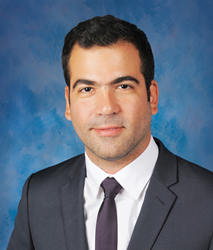
Dr. Iani Patsias is an advanced heart failure and transplant cardiologist within the Memorial Healthcare System (Hollywood, FL).
February 2, 2023 — Technology is continuously evolving, and so is the approach taken by transplant cardiologists at Memorial Cardiac and Vascular Institute to using newer monitoring technologies with heart failure patients.
There are a number of devices that track physiological data that can be either implanted or worn. Each of these approaches has its own caveats, and advance heart failure cardiologists have to balance risk vs. benefit, especially if implanting a sensor through an invasive procedure.
“The patient has to understand and perceive its benefit to comply with data collection and deliver the data to the treatment team to act and, more importantly, prevent an admission,” said Iani Patsias, MD, FACC, Advanced Heart Failure and Transplant Cardiologist.
Within implantable sensors, the only current FDA- approved device is the CardioMEMS (Abbott). It is a small (3.5x2x15mm) implantable sensor that is deployed after a right heart catheterization and lays on a descending branch of the pulmonary artery. It doesn’t require any charging and communicates with a pillow with an embedded receptor, transmitting pulmonary artery pressures via Wi-Fi. Memorial Cardiac and Vascular Institute has a dedicated team for remote monitoring of patients using the CardioMEMS device.
“We can trend pulmonary artery pressures in time and can detect a pattern out of normal. This would then trigger an intervention, for example, increasing diuretics, with a goal of preventing decompensated heart failure and an admission to the hospital,” said Dr. Patsias.
Overall, heart failure is a growing and daunting disease. Monitoring can greatly assist in improving patient outcomes and quality of life. At Memorial Cardiac and Vascular Institute, the advanced heart failure team has been involved in the development of newer sensor technologies, and it looks promising for patient care.
“As with any new technology, we will need to balance risk vs. benefit and apply technology that is meaningful to patient care. With new sensor technology will come a huge amount of new data. It will be interesting to see how AI plays a role in population health data management and predictive analysis of our heart failure patients,” Dr. Patsias said.
For more information: https://www.mhs.net/


 February 13, 2026
February 13, 2026 









